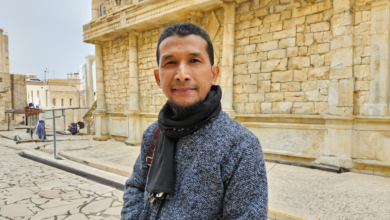Selling Land, Give Zakat Mal or Pay Debt First?

Selling Land, Give Zakat Mal or Pay Debt First?
Peace, mercy and blessings of God
Ustadz, I want to ask a question.
Which should come first, paying zakat mal from buying land or paying debts? The debt is not much, but I am confused, because I don't have enough money to pay the debt.
Then, if for example, you want to pay zakat mal but you don't have enough money, can we pay zakat mal in installments? For example, pay zakat from the sale price of half the land first?
Please enlighten me, Mr. Ustadz?
Thank you, Ustadz.
Greetings, Fulanah
ANSWER:
Peace be upon you and God's mercy and blessings be upon you
The scholars agree that the law of origin of land does not include assets that are obligatory for zakat. Because, the original status of property in the form of land is as a life support.
This is based on the hadith of the Prophet Muhammad, "There is no obligation of zakat for Muslims on their slaves and horses." (Narrated by Bukhari Muslim)
They named the treasure the treasure for qunyah. At the same time, scholars also agree that land that is sold and bought, as a business item, becomes a property that must be paid zakat every year when it reaches the nishab. Because, when the land is traded, its status has become merchandise ('urudhuttijarah). And scholars agree that merchandise is an obligatory zakat asset.
Then, what about land that is intended to be used as a long-term investment item; whose owner makes the land as a savings property that he will sell in the next few years if he needs money?
Most of the scholars are of the opinion that land is acquired by buying and will be sold in the future with the hope of getting a profit including merchandise. That way, the land owner must pay zakat every year on the value of the land.
Maliki scholars divide trade into two categories. First, al-mudir merchants (every time offering goods). For this category, he is obliged to pay zakat on his merchandise every year. This applies to people who do business property that sells all the time.
Second, al-muhtakir traders (saving long term). This merchant does not sell his goods all the time. However, he intended to hold on to his property for a few years and sell it after he made a profit. For this second category, the Maliki cleric is of the opinion that he pays zakat after selling his property one year ago. While most scholars do not distinguish between the two. This means that both of them are obliged to pay zakat every year.
In our opinion, the opinion of the Maliki school of thought is quite strong. If someone buys land for long-term investment, it means that the land is not a commodity. He had intended not to sell the land for some time. That way, at that time the status of the land was qunyah land. He is not obliged to pay zakat. He was only obliged to pay zakat after selling the land once for the past year.
From the explanation above, the purchase of land actually does not have zakat obligation, unless the funds used for the purchase of the land have not been issued zakat. For example, from income, the first 2,5 percent of zakat is issued.
In addition, it will be subject to zakat later if the land is productive. For example, rented or used as merchandise.
As for the debt, it should be repaid immediately according to the agreement with the debtor.
Wallâhu a'lam bish-showâb.
Peace, mercy and blessings of God
[Answered by: Ustadz H. Ahmad Fauzi Qosim]
#Friends of Migrants want to consult about Islamic religious issues and life issues? Come on, submit the question via WhatsApp message to number +852 52982419. [DDHK News]



